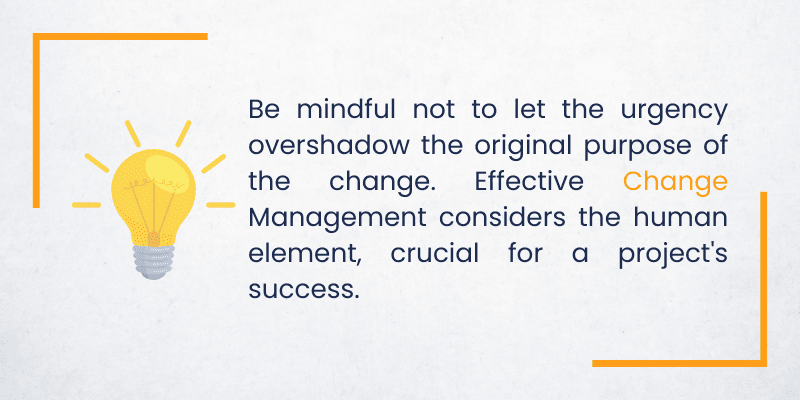

Change Management Blog
Avoiding the Pitfalls of Poor Change Management
February 5, 2023
Time to Read: 2 Min
Navigating Change Management: Consequences of Poor Change Management (OR Beyond the Minimum)
Embarking on significant organizational change demands more than enthusiasm; it requires a strategic approach to managing the transition effectively. It's crucial not to let the excitement overshadow the potential risks of hastened decisions—particularly neglecting the human aspect of change. Insufficient Change Management can lead to increased costs, extended downtimes, and a delay in realizing the benefits.
As you delve into the transition to a digital system such as an ERP implementation, understanding the nuances of effective Change Management is key. This involves recognizing the signs of inadequate practices and the importance of a human-centric approach.

Identifying Symptoms of Ineffective Change Management
During a transformation, there are signs or red flags that indicate a need for a stronger focus on Organizational Change Management (OCM) but have much more profound implications:
Skipping a Readiness Assessment: Overlooking resistance: Bypassing a thorough business readiness assessment may lead to underestimating resistance and can hinder user adoption which is Key to your Project Realization.
Neglecting Clear Communication or the lack of planning: Improvisational announcements can lead to uncertainty. Early and structured communication aligns with the business rationale driving the change. Sudden changes can lead to confusion; early and clear communication is essential.
Absence of Project Sponsorship: Active leadership support is crucial to foster stakeholder engagement. Without a clearly defined sponsorship roadmap, gaining and guiding executive support becomes a challenge.
Inadequate Training for End-Users: Insufficient training compromises the understanding of new systems and processes, essential for business process reengineering. Comprehensive product training – to help build the Knowledge - is vital for familiarizing staff with new processes.
Resistance Management: Anticipating and addressing resistance through a well-devised plan fosters adaptability among the workforce. Addressing resistance proactively promotes adaptability.
Lack of Employee Feedback: Engaging with employee insights post-implementation is vital to fine-tune support and address any issues effectively. Feedback is essential to refine and support any transition.
Consequences of Neglecting Change Management
The repercussions of weak Change Management can manifest at different levels:
At the Project Level: You risk project delays, budget issues, and potential project & operational failure like low ERP benefits and potential abandonment.
Organization-Wide Impact: Long-term effects can lead to decreased productivity, high staff turnover, and overall dissatisfaction among stakeholders.
System-Related Issues: A lack of focus on continuous improvement can result in an ERP system that fails to align with evolving business goals.
The Path Forward
Recognizing and Investing in robust Change Management is as crucial as the ERP system selection itself and equates to acknowledging the direct impact it has on your project's ROI. Investing in a dedicated team and resources for Organizational Change Management not only speeds up the benefits realization but also ensures alignment with long-term business objectives. A dedicated Change Management resource and budget will significantly shorten the path to realizing the full benefits of your project.
The stakes of inadequate Change Management are high and too substantial to overlook, and our team is equipped to guide you through the OCM process, ensuring your transformation is successful and boost your project's return on investment.
Reach out for a free consultation to begin your journey toward a resilient and adaptive organizational structure and ensure your change initiative thrives.
RelatedBlog Articles
The 5 Areas That Define Your Organizational Change Capability
Names & Locations of the Change Management Office



